CYHSB WEEKLY

This week’s Weekly is sponsored by Rivki and Hillel Wiener in honor of Chani and David Fleischacker, and everything they’ve done for the Memphis Jewish Community.



This week’s Weekly is sponsored by Rivki and Hillel Wiener in honor of Chani and David Fleischacker, and everything they’ve done for the Memphis Jewish Community.

Raanan Vanderwalde (’25) Two Wednesdays ago, we had the privilege of hearing from Sam Weinreich. Mr. Weinreich is a 103 year-old Holocaust survivor that came to the MHA to share his story with the students. He has given his speech to students in the past, but hasn’t been to the school in a couple of years due to Covid. The CYHSB, GMSG, and the junior high all gathered in the
beit midrash around ten o'clock to hear his incredible story. This once in a lifetime experience of hearing from a Holocaust survivor is becoming increasingly rare as the years go on.
Mr. Weinreich began his story from the beginning, in the Polish city of Lodz. He was born into a large Orthodox family, with a total of 11 people. The
Weinreichs were thriving in Poland, owning four antique shops. Mr. Weinreich was a singer as a kid, performing in his synagogue's choir. Just around when he turned 20, the Nazis invaded Poland. He and his brother traveled on foot to Warsaw in an attempt to run from the Nazis, planning to settle down with family members who lived there. In Warsaw they heard the news that Lodz was invaded and decided to go back to their family. They made the trip home on foot, getting separated along the way. Finally, after days of traveling, Mr. Weinreich arrived back in Lodz and his family was moved to the Lodz Ghetto. Many of his family members died of starvation in the ghetto. He told of the terrible action many remaining Jews did of pretending that the dead were alive in order to get more food rations.
One day, Mr. Weinreich was told to get on a train headed towards the labor camps, but he knew of no such thing. He thought the tracks were going to Germany; somewhere safe, not a labor camp. When he arrived at the trains he knew something was off. He and many other Jews were crammed into a tiny cattle car headed for Auschwitz. The conditions were life threatening and he remembers people dying upon arrival because they were too weak to stand. Upon

and later shipped to Dachau. In the camp, disease ran rampant and many people died of diseases like Typhus. Mr. Weinreich got Typhus at one point but was lucky enough to survive. He still clearly remembers one story from the camp in which he tried to smuggle a potato and was beaten up, losing seven teeth. One day, he was being transported on a train when it was bombed. The train went off the tracks and he and one other passenger escaped into the woods.
Mr. Weinreich ended up at a displaced persons camp in Germany and there he met his wife, Freida. Together they moved to the United States, ending up in Memphis, Tennessee. Out of the eleven people in his family, he was the only one to survive.
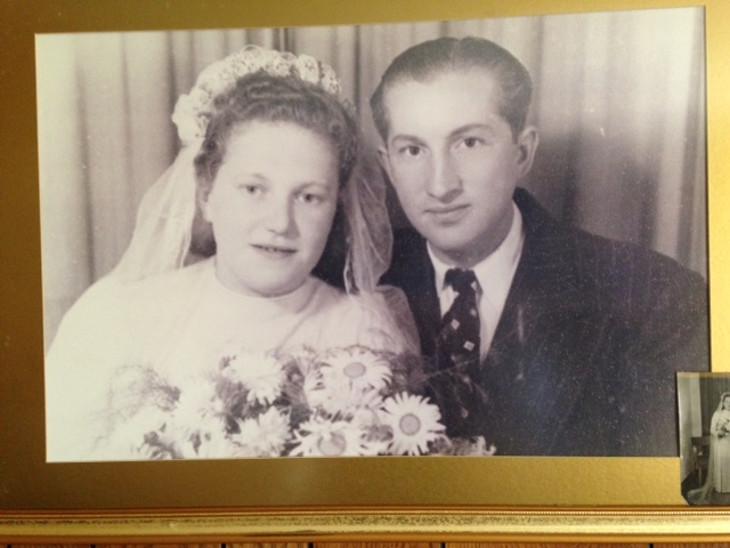
This experience of listening to Mr. Weinreich was meaningful to
all of the students. For many of us it was the first time hearing first hand information about the tragedies that occurred during the holocaust.
CYHSB sophomore Ethan Vanderwalde said, “It was saddening to hear about everything that happened to Mr. Weinreich, but at the same time inspiring to learn about how he persevered and survived everything that was thrown at him.”
Elie Wiesel, a famous holocaust survivor and author once said: “To forget would not only be dangerous but offensive; to forget the dead would be akin to killing them a second time.” Remembering the Holocaust is one of the most important things we can do as a growing generation, especially as anti-semitism gains traction around the world. It is up to us to pass on the memories of the survivors and retell their stories to everyone.
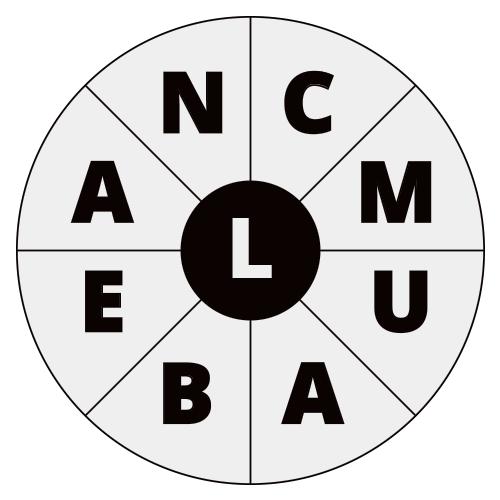
Whoever sends in the most words found in the wheel wins!!
Last Week’s Answer: 21 Congratulations to Scott McCann for being the first person to send in at the correct answer!

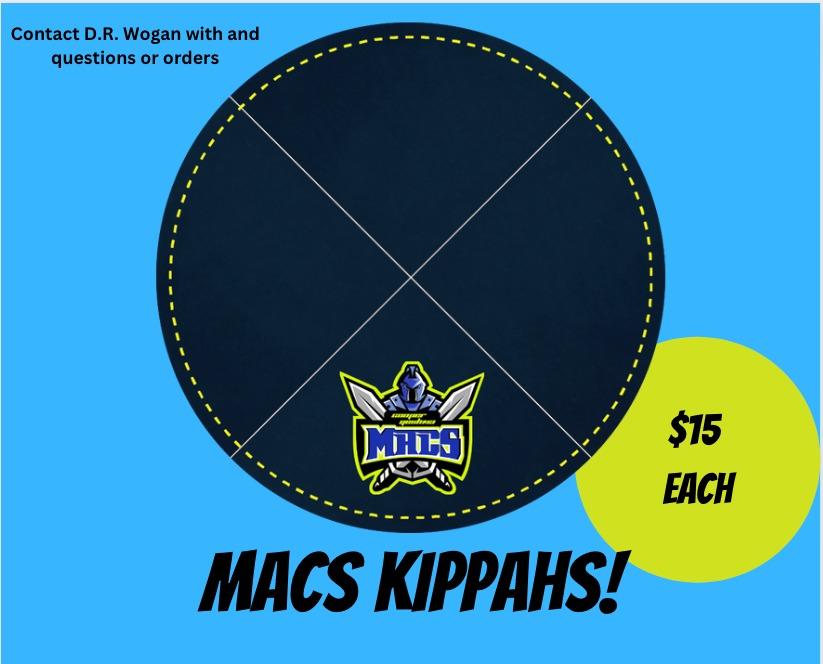
There will be a different puzzle each week, so stay tuned!
First person to send in a completed puzzle to ezra.wiener@mhafyos.org gets a prize!
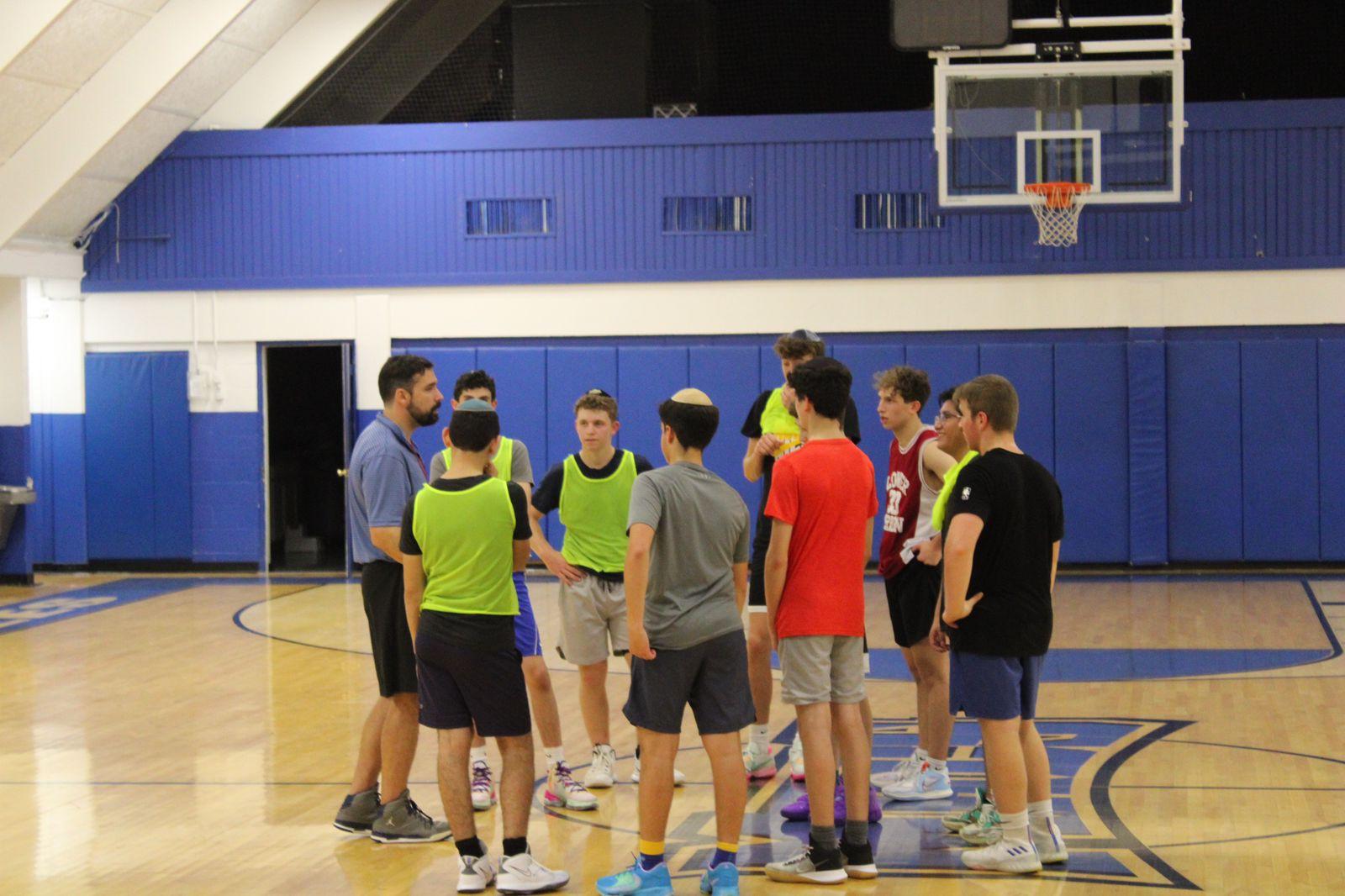
Yosef VanderWalde (’22) When we left school for summer break last year, the prospects for the Cooper Macs basketball team were dismal. Last year the team was held together by seven players who graduated in the class of 2022. There were no players from the class of 2023. The remaining players of the Cooper Macs were worried about their numbers and the loss of talent in the former senior class. However, the influx of new students to the 11th and 12th grades has reinvigorated our team, and this year’s Cooper Macs are better than ever!

There are three key players returning to our basketball team: Rafi Goldkin, Nathan Greenbaum, and me, Yosef VanderWalde. Rafi Goldkin, only a freshman last year, was one of the best players and frequently played as the sixth man on a team of seniors. Nathan was one of the best shooters on last year's team and returns even better this year. He can take his opponents to the rim where he can knock down easy points, a crucial advantage for winning games. I’m working on maximizing my height by improving my vertical, getting closer to a dunk with each practice. There are also some freshmen who have joined the team this year whose skills are being cultivated.
Over the summer we acquired many new recruits from throughout the country. We signed two young players from St. Louis, Adam
the rest of the team can rely on. Avi Becker, who recently moved to Memphis from Pittsburgh, is a great ball handler who loves to shoot the three ball. However, when he doesn’t have an open look, Avi is also comfortable with a drive to the basket where he makes acrobatic finishes. Another new face on the basketball team is Zechariah Lichter. Zechariah is extremely explosive and is unguardable to any defender. In addition to exploding into the paint, Zechariah occasionally gets an open look from three, from which he can knock down a shot with ease. The last player that we recruited over the summer is DR Wogan, who had previously played for CYHSB in his freshman year. After honing his skills on the courts of Chicago, where he played
basketball for the Fasman Yeshiva in his junior year, DR returned to
incredible shooter who is also unstoppable in the paint. He can lead the team on both sides of the ball and is committed to helping make the team
stacked roster, the Cooper Macs have been invited to
Tournament in New York City this spring. Sarachek is a tournament where throughout the country compete in high level basketball. It is an incredibly special and unique chance for our players to play in a tournament with other Jewish schools, an opportunity that we rarely get living in Memphis, TN. Given the increasing cost of travel and the rising tournament fees, the basketball team has embarked on fundraising efforts so that we can make sure all players can attend the tournament. We are selling super cool Macs Kippahs for $15 each, and we are planning many more fundraising events over the next few months leading up to the tournament. The whole team is extremely excited to show off our skills at Sarachek and show the rest of the country what the Cooper Macs can do!
Top Left: The Basketball Team team plays a game of who can touch each other's hands for the longest. Top Right: Adam Felsher tries wearing a piece of swiss cheese to improve his three pointer. Middle right: Felsher raises his arm in a futile effort to save DR as he slowly floats to the ceiling. Bottom middle: Jack Kampf pretends to dribble the ball after everyone has left, as far as we know he's still there. Bottom Left: Yosef and DR perform a ritualistic dance in order to summon a ball out of thin air.






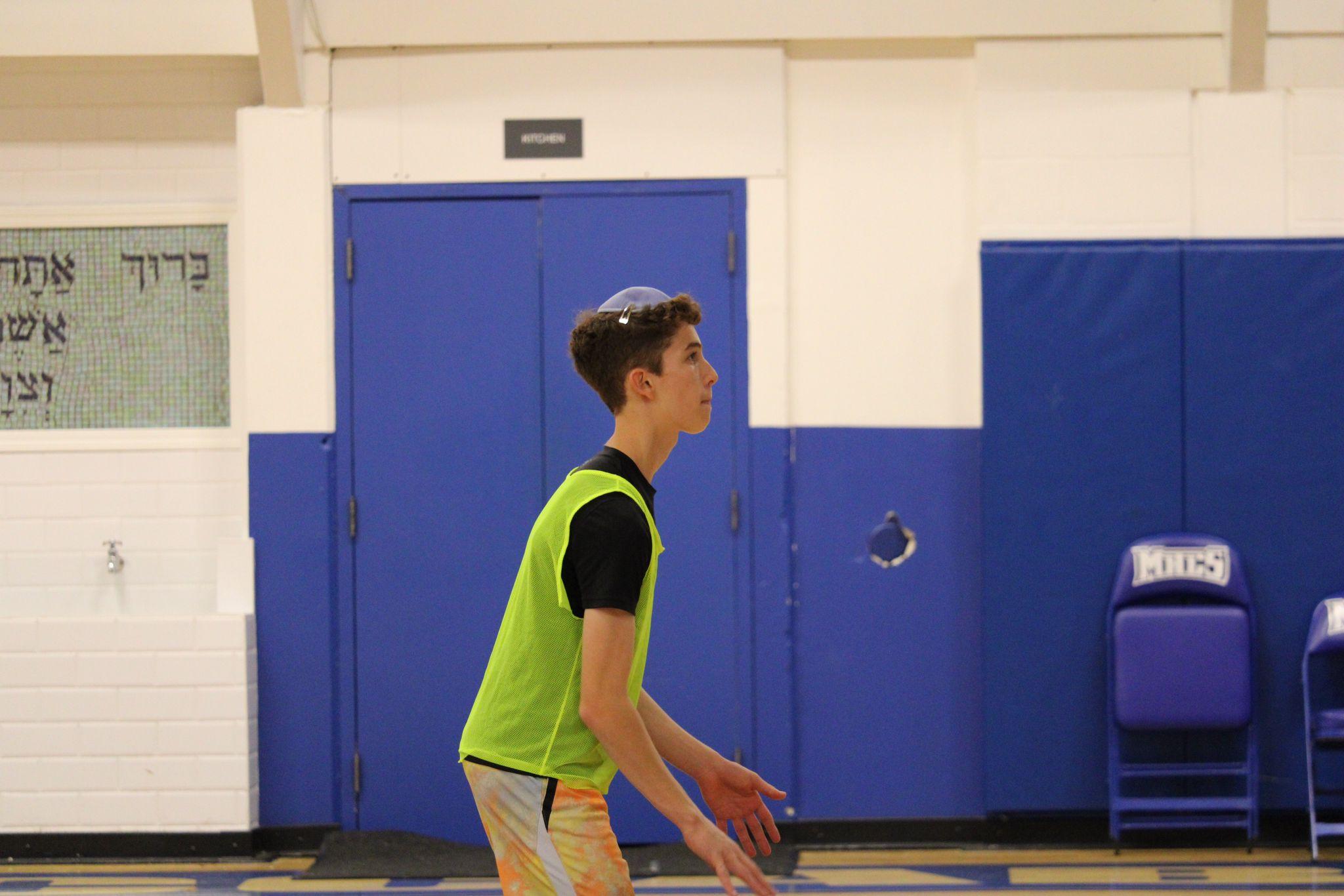
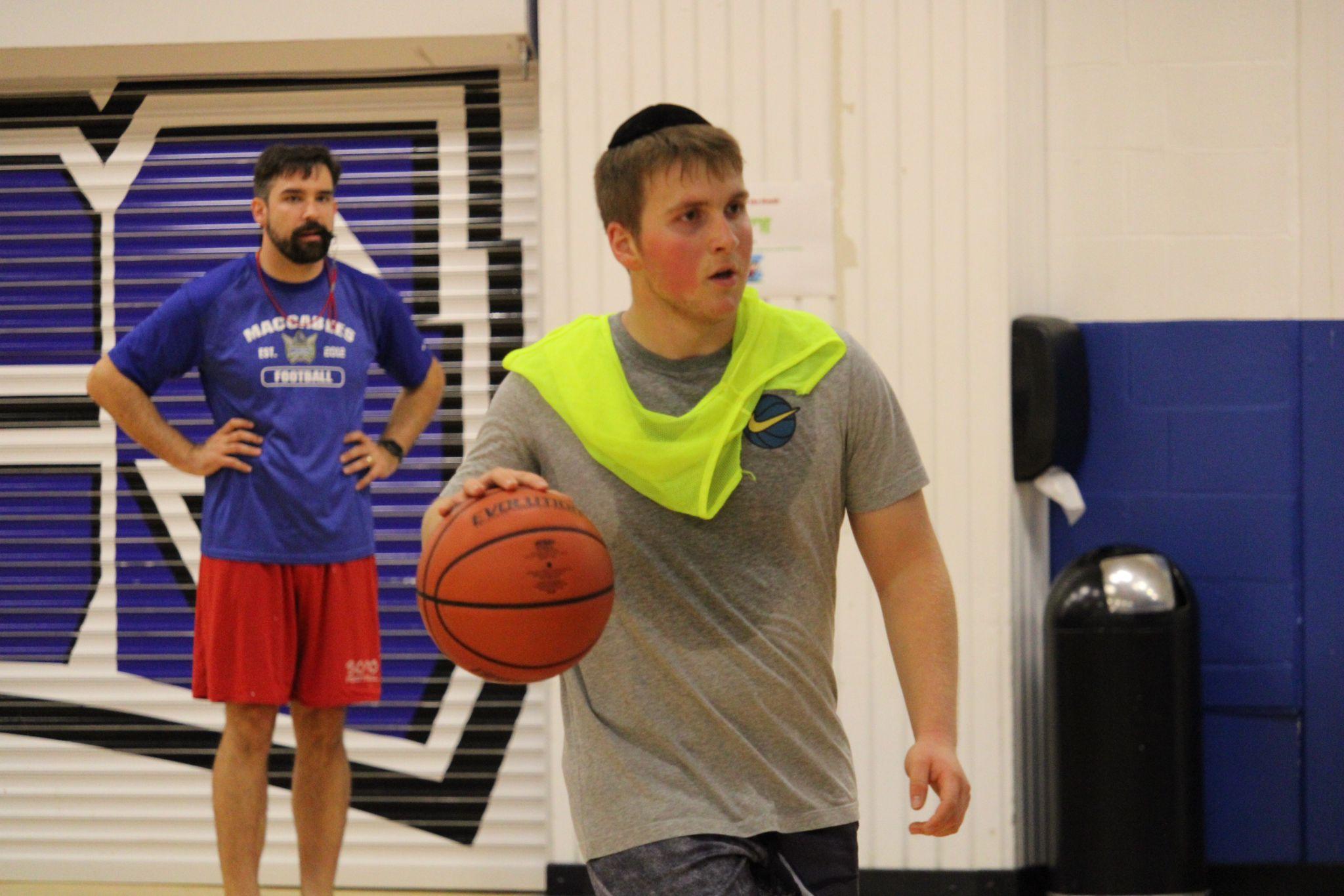
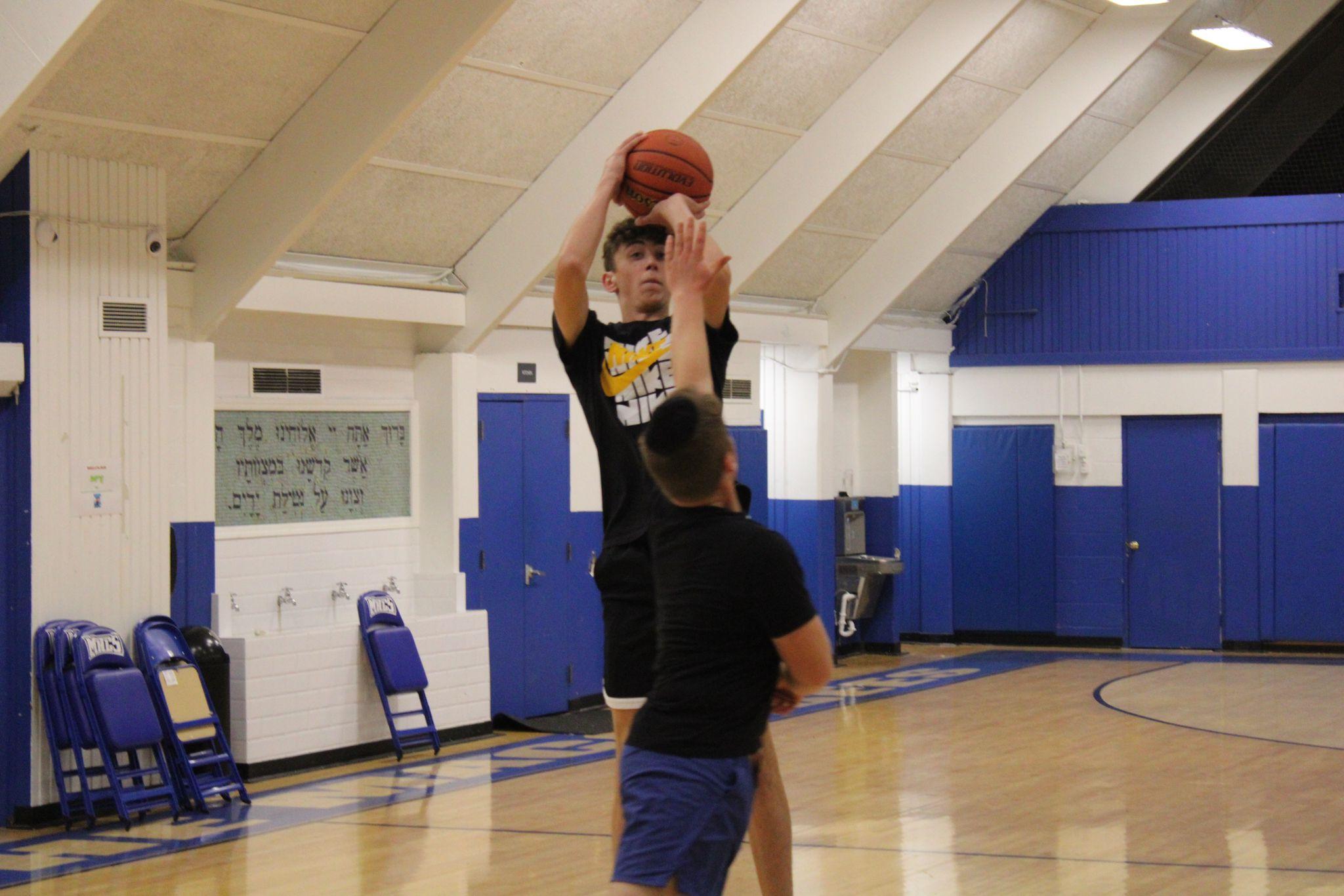
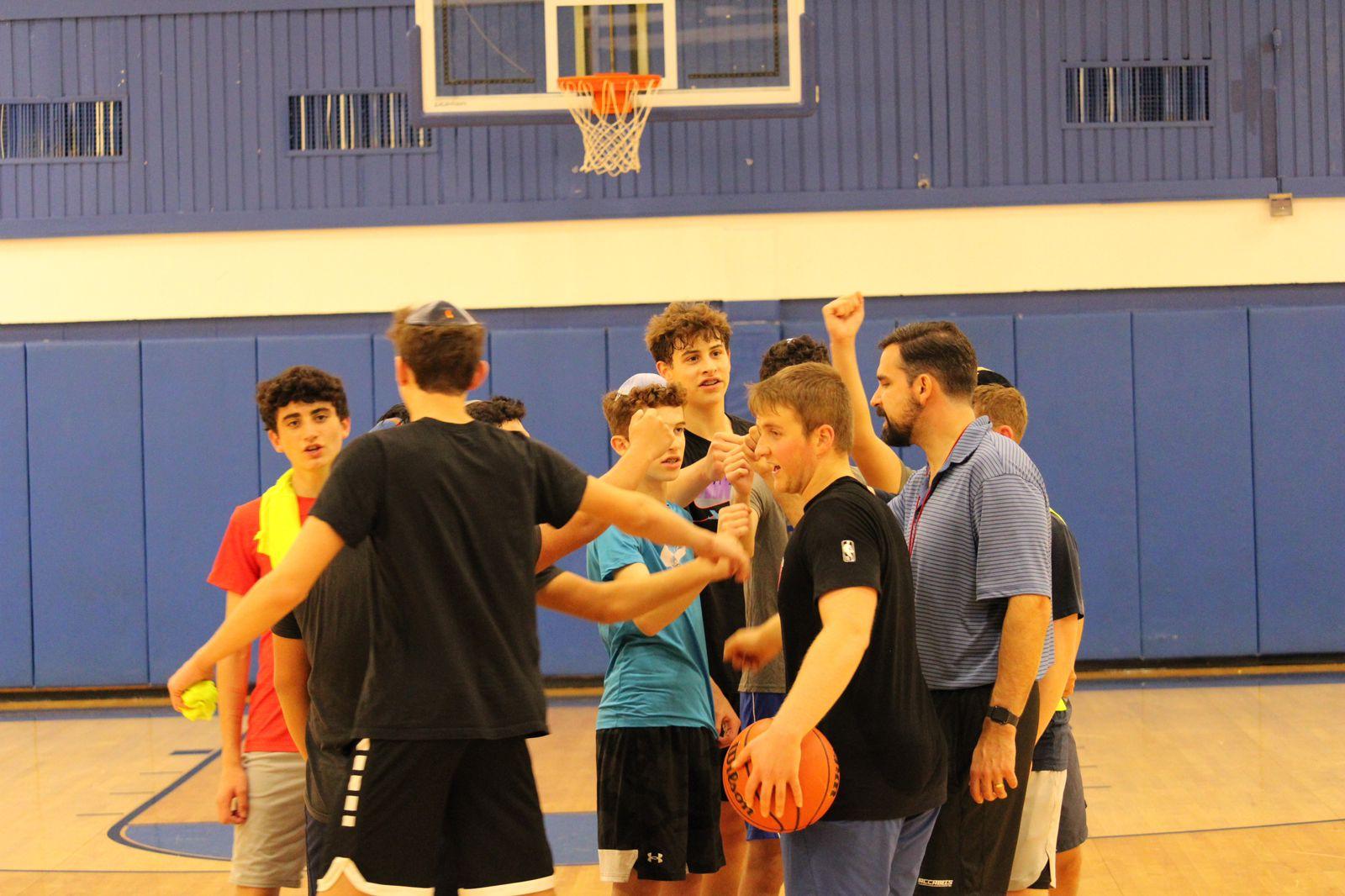
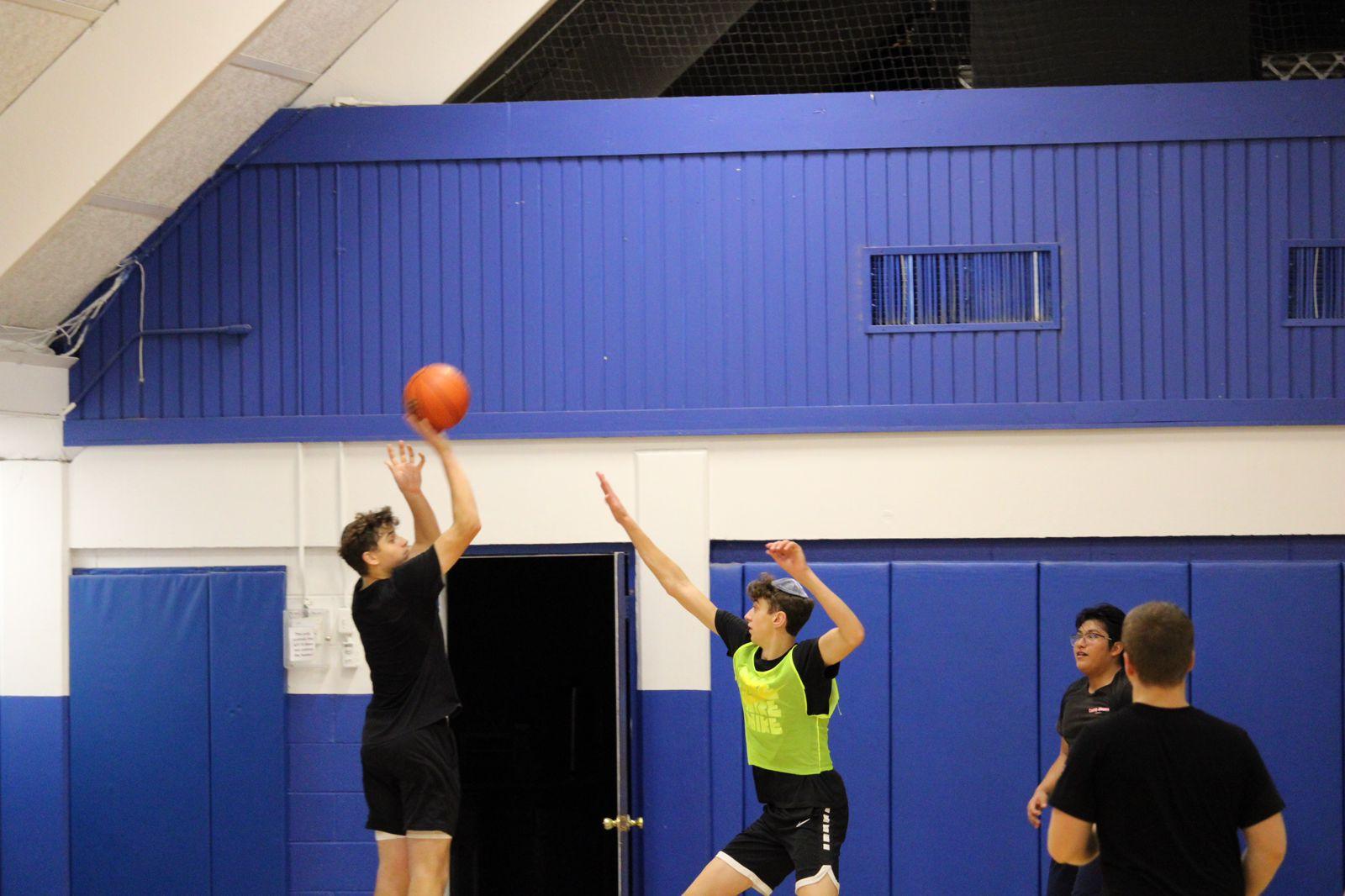
Avi Becker (’24)
This week’s parsha begins with the death of Sarah at the age of 127. Avraham then searches for a place to bury her and settles on Maharat Hamachpelah. So why does Avraham go through so much work to find the proper place? In fact, what is all of Judaism’s obsession with places? For example, we must face Israel when davening Israel, there are only count in Israel and many more.
Perhaps the answer can be found in a story. I was once a guest in a particular morning, for 9:00 AM. I showed up at 9:00 AM and there was nobody there except for me and the rabbi, so I sat down in what seemed like a good seat.
The reason for this music-free game of musical chairs is the concept of “makom kavua,” a person’s designated place in his
daven in a permanently-designated location, then when he dies, people will say of him, “Such a humble person! Such a pious person! He was one of the disciples of our father Avraham!” But disagree
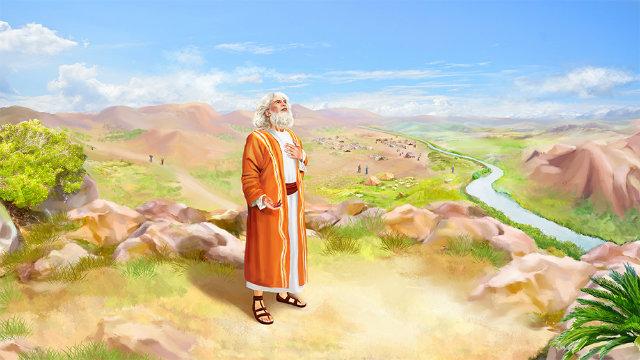
as the entire designated for prayer! But . The Shulchan Aruch rules as much: “A person
Avraham’s purchase of Maharat Hamachpelah highlights the importance of a makom kavuah. aish.com
Around ten minutes later, the next minyan participant arrived. He walked straight over to me with no greeting and bluntly said, “You’re in my seat.”
I looked around incredulously at the empty room, full of equally functioning chairs. I shrugged and moved to the next row. Believe it or not, the exact same thing happened with the next person’s arrival.
It took until 10:00 for a minyan to actually form and by then I was instructed to move five times between the minyan’s scheduled starting time and it finally getting underway.
synagogue.
The Talmud in Brachos (6a) attributes the origin of a makom kavua to Avraham. We all know that Avraham is credited with establishing the morning prayer service, as per Genesis 19:27, “And Avraham got up early in the morning…” The end of that verse teaches us the concept of a makom kavua: “…to the place where he had stood before Hashem.” We see from this that Avraham was careful to daven in the same place.
Makom kavua is an important concept. The Talmud in Brachos continues that if one is careful to

writes on this that “within four cubits (about six feet) is considered being in the same space; it’s impossible to be exact.”
The Aruch HaShulchan (OC 90:23) says that the idea of a makom kavua is to daven regularly in the same shul and not to move around constantly. Within the shul, it’s advisable to daven in the same general area, not on the east side today and the south side tomorrow, but he also specifies the impossibility of always securing the exact same seat.
Let’s return to the Shulchan Aruch quoted above (OC 90:19). That sentence begins, “A person should establish a place for his prayers.” It continues, “that he
should not change…unless necessary.” Ergo, one may sit somewhere else if necessary. What would render it necessary? Maybe if someone else is already sitting there. (And remember, sitting anywhere within a six-foot radius is still considered in the same place, anyway! All the authorities say that one cannot be exact in this matter!)
We learn the concept of a makom kavua from Avraham but that’s not what Avraham is best known for. His primary characteristic was chesed (kindness). He is remembered for hachnosas orchim (hospitality). Do you really think Avraham would chase a visitor out of his seat? When you bark at a guest that they’re in your spot, they don’t think you’re
humble or pious or a disciple of our father Avraham. They think you’re a jerk.

So why is Israel so important but a Makom kavuah seemingly isn’t. That’s because going to Israel wouldn’t cause pain to others. Being nice always takes the front seat when it comes to Judaism. Places are important, but people take priority.
Send in a caption that you think fits the picture to ezra.wiener@mhafyos.org.
The Weekly staff will vote on whose they find funniest, and the winner will be featured in the next edition.

A sponsorship is a great way to honor the memory of a loved one, celebrate an accomplishment, or just show appreciation to the CYHSB Weekly. We reach hundreds of people each week, helping to get your announcement out for just $20.
Editor-in-Chief
Ezra Wiener | ezra.wiener@mhafyos.org
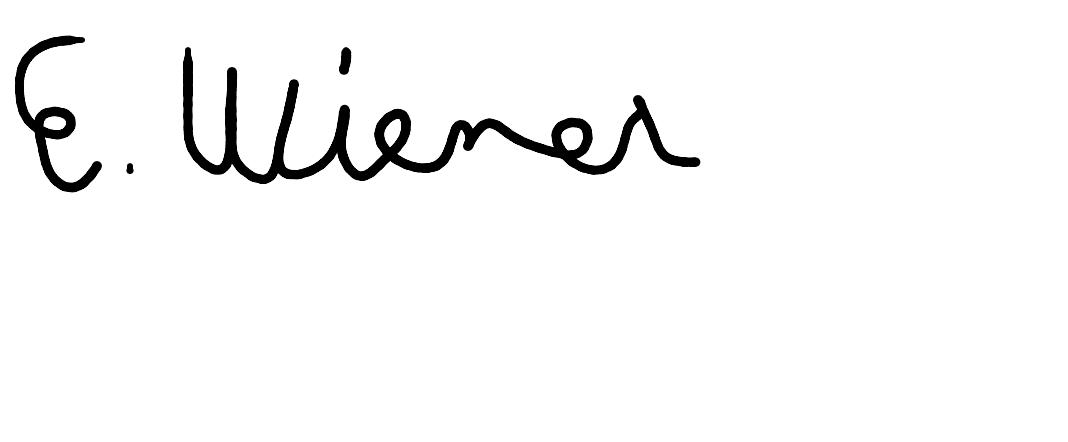

Ezra Davidovics | ezra.davidovics@mhafyos.org
Editors
Ethan VanderWalde | ethan.vanderwalde@mhafyos.org
Nathan Greenbaum | nathan.greenbaum@mhafyos.org
Raanan Vanderwalde | raanan.vanderwalde@mhafyos.org
J.J. Stein | jacob.stein@mhafyos.org
Akiva Levine | akiva.levine@mhafyos.org
Amit Zalman | amit.zalman@mhafyos.org
Avi Becker | avi.becker@mhafyos.org
Baruch Finkleman | baruch.finkleman@mhafyos.org
Rafi Davidovics | rafael.davidovics@mhafyos.org
Joshua Parcover | joshua.parcover@mhafyos.org
Yaron Weiss | yaron.weiss@mhafyos.org
Benny Freiden | benny.freiden@mhafyos.org
Rafi Goldkin | rafael.goldkin@mhafyos.org
Yosef VanderWalde | yosef.vanderwalde@mhafyos.org
Jojo Ardestani | jonathan.ardestani@mhafyos.org
Nadav Lowell | nadav.lowell@mhafyos.org
Mrs.
Parshas Chayei Sarah teaches us the importance of places no matter what they are for. Having a proper makom is essential for almost everything especially sports, as you can’t play basketball without a court. We can also learn this ideal for Mr. Sam Weinreich who taught us that the places you may think are safe, may not be safe at all, and the only true home for Jews is Israel.